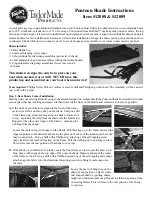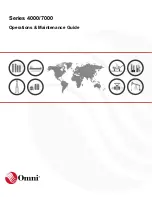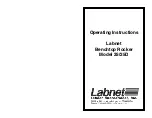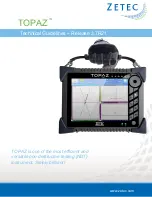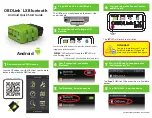
4
860 814 R. 07/19
SAMOA Industrial, S.A. · Pol. Ind. Porceyo, I-14 · Camino del Fontán, 831 · 33392 - Gijón - Spain · Tel.: +34 985 381 488 · www.samoaindustrial.com
2019_07_17-14:00
This pump is self–priming. To prime it the first time, you must connect the
air supply to the pump and slowly increase the air pressure from 0 to the
desired pressure using a pressure regulator, while keeping the outlet valve
(ex. a fluid control gun) opened. Once oil starts to come out through the
gun, the pump is primed.
NOTE:
It is important that the foot valve of the pump does not come into
contact with dirty areas, such as a workshop floor, because it may become
contaminated with dirt or foreign particles that can damage the seals.
Symptoms
Possible reasons
Solutions
The pump is not working or there
is no fluid delivery.
Not enough air supply pressure.
Increase the air supply pressure.
Some outlet line component
is clogged or closed.
Clean or open the outlet circuit.
The pump begins to operate very fast.
The drum/ container is empty.
Replace the drum or fill the container.
The pump runs on continuously after the
fluid outlet is closed.
There is an fluid leakage in some point
of the outlet circuit.
Verify and tighten or repair.
Contamination in the upper valve
or in the foot valve.
Disassemble and clean. Replace if damaged.
Fluid is leaking through
the exhaust muffler.
Fluid has by-passed to the air motor
caused by worn or damaged packing.
Replace the packing.
Air is leaking through
the exhaust muffler.
The air seal is worn or damaged.
Replace the air seal.
The air motor cylinder is scored.
Replace the air motor cylinder.
The air piston rod is scored.
Replace the air piston rod.
The reversing set is worn or damaged.
Replace the reversing set.
The fluid delivery is diminished.
Contamination in the upper valve
or in the foot valve.
Disassemble and clean. Replace if damaged.
Esta bomba es auto-cebante. Para cebarla la primera vez, es conveniente
que conecte el aire a la bomba incrementando la presión lentamente
desde 0 bar a la presión deseada con el regulador de presión,
manteniendo la válvula de salida (ej. una pistola de control de fluido)
abierta. Cuando el aceite empieza salir de la pistola, la bomba está
cebada.
NOTA:
Es importante que la válvula de pie no esté en contacto con zonas
sucias, tales como el suelo de un taller, porque puede entrar virutas o
partículas que podrían llegar a dañar las juntas.
Cette pompe est auto-amorçante. Pour l’amorcer pour la première fois, il est
conseillé de brancher l’alimentation en air à la pompe et d’augmenter
progressivement la pression d’air à partir de 0 bar jusqu’à atteindre la
pression désirée à l’aide du régulateur de pression et ce, tout en maintenant
la vanne d’arrêt de sortie de fluide ouverte (par exemple, une poignée de
distribution de fluide). La ou les poignées de distribution commenceront
donc à distribuer de le fluide dès que la pompe sera amorcée.
NOTE: Il est primordial que le clapet de pied ne soit jamais posé à même le
sol pour éviter ainsi que des impuretés n’endommagent les joints.
Die Pumpe ist selbstsansaugend. Luftzufuhr anschliessen und den Druck
mit Hilfe des Manometers langsam von 0 auf den gewünschten Druck
erhöhen. Dabei soll der Ölauslauf geöffnet sein (z. B. die Auslaufpistole).
ACHTUNG: Beim Wechseln des Fasses darf Saugleitung niemals den Boden
berühren. Verschmutzung und somit Beschädigung der Pumpe sind die Folgen.
EN
ES
FR
DE
OPERATION / MODO DE EMPLEO / MODE D’EMPLOI / INBETRIEBNAHME
EN
TROUBLESHOOTING / ANOMALÍAS Y SUS SOLUCIONES /
ANOMALIES ET SOLUTIONS / PROBLEME UND DEREN LÖSUNGEN













